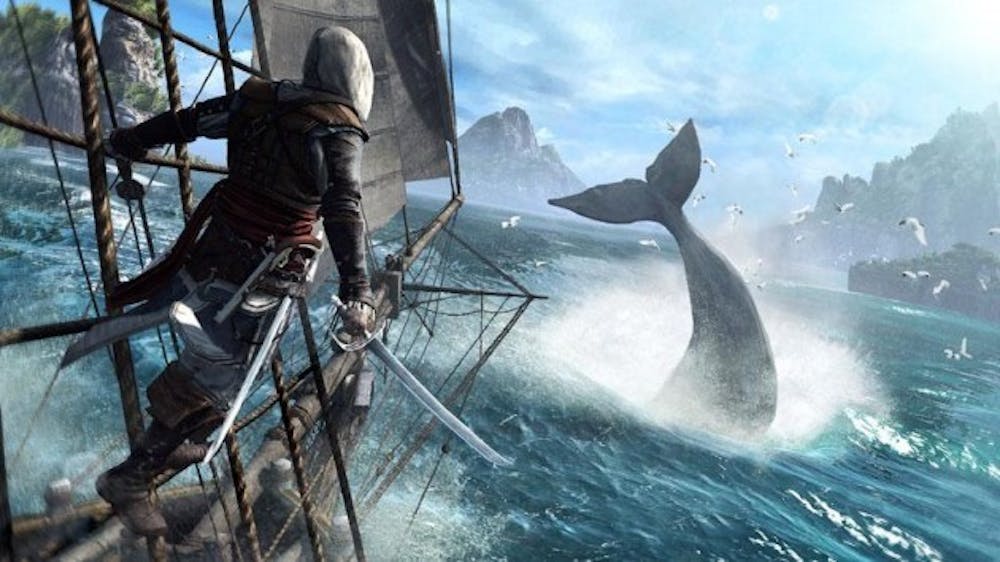Battling a British man of war as rogue waves and typhoons smash other boats to pieces is one of the innumerable yet memorable moments awaiting players in Assassins Creed IV: Black Flag.
Ditching the American Revolution for the Caribbean during the Golden Age of Pirating in the early 18th century, the sixth and newest installment of one of this generation's biggest franchises delivers not only a superior experience over recent installments like Revelations and Assassins Creed III, but the best and most ambitious Assassins Creed title to date.
Taking the helm as captain of the Jackdaw, players control Edward Kenway, a Welsh privateer-turned pirate searching for wealth and riches by preying on Colonial ships in the West Indies. A likeable man of simple ambition, Captain Kenway wears his convictions as comfortably as he does the robes of the Assassins Order.
In his search for riches on the high seas, Edward comes across the Assassins' robes and is quickly drawn into the age-old conflict between the Templars and Assassins as both sides search for "The Observatory."
The premise starts off rather simply, but the story is one of the best written in recent franchise history and doesn't suffer the pacing or plot issues of previous titles. Events throughout the game present the series' conflict between the Templars and Assassins in a larger scale and are brought to exceptional and emotional heights by the game's phenomenal cast.
Ranging from infamous pirates like "Calico Jack" Rackham, Black Bart and Blackbeard to the lesser known likes of Anne Bonny, Charles Vane and Mary Read, the world of Black Flag is full of characters with their own principles, ambitions and personalities. Some, though deplorable at times in their actions, still manage to win over our sympathy in the end.
It is only after taking command of the Jackdaw that players can truly enjoy the game's freedom and content.
The game's world is enormous - the series' largest to date - and it's filled with reasons for players to explore it. There is a seemingly infinite amount of activities to complete, side quests to explore and treasure to find, all of which - with the exception of entering the game's larger cities and ports - is readily at the players' fingertips without any load screens.
Players can quickly go from obliterating an enemy frigate to diving underwater to search the wreckage for treasure, all before exploring a nearby island for animals and Mayan relics or bombarding an enemy fortress.
Though some tasks like taking over a fortress or boarding an enemy boat may become repetitive, the experience as a whole is an absolute blast, providing players with a sense of freedom that few games can match.
Settings within the game's world are as diverse as the experiences it provides - taking players from lush tropical forests or sandy beaches one minute to plantations, ancient ruins or large towns the next.
While players are sailing the open seas in search of another cave to plunder or royal fleet to send down to Davy Jones' Locker, the Jackdaw's crew will burst into song or shout out when loot or castaways are nearby for the player to pick up. The crew keeps the game's lively atmosphere afloat, but players will have to constantly be on their toes when they sail on the open seas.
Enormous storms with typhoons and rogue waves replace sunny, calm weather in seconds, which makes naval combat all the more exciting and is one of the many ways the world feels like it is constantly changing around the player.
Naval combat has seen a vast amount of improvements since Assassins Creed III and is now streamlined, allowing players to trigger various attacks by looking at a certain direction of their ship. Looking ahead will cause chase cannons to fire; looking to either side will cause devastating cannon barrages. It's a simple system, but it keeps naval combat smooth and frenetic with the exception of aiming mortars through the spyglass, which can be disorienting.
Upgrading the Jackdaw becomes essential to the player's progress throughout the game. By capturing ships or sinking them for half the booty, players gain precious recourses like wood, metal, cloth and gold that can be used to purchase upgrades for the ship along with sugar and rum that can be sold to further line Edward's pockets.
With so many improvements from previous games, the things that go unchanged stand out even more, and Black Flag still borrows many of the same mission types from previous games, like tailing or eavesdropping on targets. These missions become old, repetitive and monotonous quickly, especially for fans of the series.
Where naval combat saw many improvements over Assassins Creed III, regular combat is identical to that of the game's predecessor. Combat still heavily relies on countering enemies and then unleashing brutal killing blows on a slew of them, and this formula desperately needs some invigoration.
Having four pistols and two swords may look cool, but it has almost no impact on the game play. Thankfully, the game does streamline the inventory system, making switching equipment mid-engagement much easier than in Black Flag's predecessor.
Unfortunately, the AI still hasn't changed very much either. Enemy types behave exactly like they have in previous games, attacking one by one and then standing around as the player cuts them down in droves.
Assassins Creed IV: Black Flag is an outstanding addition to the series and even manages to make life outside of the Animus engaging and entertaining in a way that previous games have struggled to do. Though it still struggles to create engaging game play on land, sea and in the game's open world, the game is an absolute blast to play; it is worthy of players plundering it for dozens of hours worth of entertainment.
email: arts@ubspectrum.com





